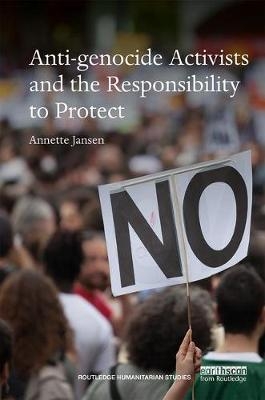
Anti-genocide Activists and the Responsibility to Protect
Seiten
2017
Routledge (Verlag)
978-1-138-69141-4 (ISBN)
Routledge (Verlag)
978-1-138-69141-4 (ISBN)
Although the Genocide Convention was already adopted by the UN General Assembly in 1945, it was only in the late 1990s that groups of activists emerged calling for military interventions to halt mass atrocities. The question of who these anti-genocide activists are and what motivates them to call for the use of violence to end violence is undoubtedly worthy of exploration.
Based on extensive field research, Anti-genocide Activists and the Responsibility to Protect analyses the ideological convictions that motivate two groups of anti-genocide activists: East Timor solidarity activists and Responsibility to Protect (R2P)-advocates. The book argues that there is an existential undercurrent to the call for mass atrocity interventions; that mass atrocities shock the activists’ belief in a humanity that they hold to be sacred. The book argues that the ensuing rise of anti-genocide activism signals a shift in humanitarian sensibilities to human suffering and violence which may have substantial implications for moral judgements on human lives at peril in the humanitarian and human rights community.
This book provides a fascinating insight into the worldviews of activists which will be of interest to practitioners and researchers of human rights activism, humanitarian advocacy and peace building.
Based on extensive field research, Anti-genocide Activists and the Responsibility to Protect analyses the ideological convictions that motivate two groups of anti-genocide activists: East Timor solidarity activists and Responsibility to Protect (R2P)-advocates. The book argues that there is an existential undercurrent to the call for mass atrocity interventions; that mass atrocities shock the activists’ belief in a humanity that they hold to be sacred. The book argues that the ensuing rise of anti-genocide activism signals a shift in humanitarian sensibilities to human suffering and violence which may have substantial implications for moral judgements on human lives at peril in the humanitarian and human rights community.
This book provides a fascinating insight into the worldviews of activists which will be of interest to practitioners and researchers of human rights activism, humanitarian advocacy and peace building.
Annette Jansen has a professional background in humanitarian policy making and obtained a PhD in social cultural anthropology at Amsterdam VU University, Netherlands. She currently works as an independent researcher and policy adviser on themes related to conflict, peace building, religion and gender.
1. Introduction
2. A History of Two Movements
3. Preserving the Life of the Group
4. Horror at Mass Atrocities
5. Advocating Moral Truths
6. Legitimising Interventions
Conclusion: The Sacralisation of Humanity
| Erscheinungsdatum | 06.07.2017 |
|---|---|
| Reihe/Serie | Routledge Humanitarian Studies |
| Zusatzinfo | 2 Halftones, black and white; 2 Illustrations, black and white |
| Verlagsort | London |
| Sprache | englisch |
| Maße | 156 x 234 mm |
| Gewicht | 453 g |
| Themenwelt | Geisteswissenschaften ► Geschichte |
| Sozialwissenschaften ► Politik / Verwaltung | |
| Sozialwissenschaften ► Soziologie ► Spezielle Soziologien | |
| ISBN-10 | 1-138-69141-0 / 1138691410 |
| ISBN-13 | 978-1-138-69141-4 / 9781138691414 |
| Zustand | Neuware |
| Haben Sie eine Frage zum Produkt? |
Mehr entdecken
aus dem Bereich
aus dem Bereich
eine Einführung
Buch | Softcover (2024)
De Gruyter Oldenbourg (Verlag)
29,95 €


